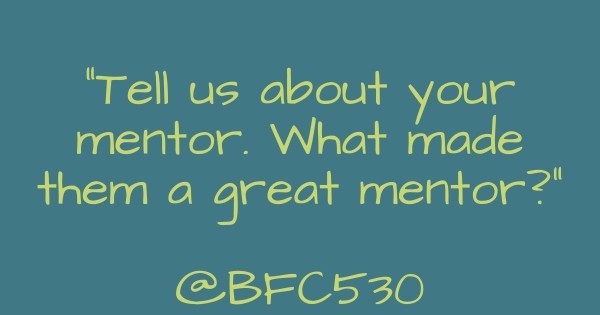One of my new favorite Twitter chats is #BFC530. It has a positive slant and happens at 5:30 each weekda y by give one question 15 minutes of attention.
y by give one question 15 minutes of attention.
This morning the question from @BFC530 had me bubbling over with praise for some select teachers in my career: “Tell us about your mentor. What made them a great mentor?”
Do you have Just one Mentor?
Your teaching career is long. I did not think about it going into my mentor-mentee relationships, but it makes sense to have more than one mentor over time. I have several mentors. I had assumed this was largely because I moved so often early in my career. However, looking back now it was also due to the fact that I needed different things at different times. Someone once asked me to be their mentor; I was taken aback at first. I thought it didn’t work that way, someone formally asking you to mentor them. But it works differently each time, at least it should since each relationship is different in context. Differing people, at differing stages of their lives, at different times in their careers. So if there is no exact time to be mentored, and if there is not an exact way to be a mentor, how many mentors have you had – so far?
How would a Mentor “teach” a Teacher?
A good mentor lets you make the (little) mistakes and is there to talk it through as soon as you realize it. This appears to be the learning technique which has the biggest impact on me. I say that because several of my mentors have allowed me to make some (low-stakes) mistakes and really step in it but good before bringing up my choices to me and asking if I received the result which I was after. Admire the fortitude it took not to just warn me off from my path, appreciate that each of those mentors were able to sit silently by and watch me make the wrong choice in order to get me to the place where I would recognize the right choice next time. And how brilliant were they to realize how I needed to learn a lesson – through some definite inconvenience and mild (mental) pain. Those sure were smart teachers. But more than that they were also confident professionals who could recognize what lesson I needed and when I needed it.
What does a Mentor “Do?”
To describe the relationship with a mentor is to describe how you feel. You feel right in talking to this person about your deepest concerns about your practice, you feel like this person will give you insight that will contribute to your success. You recognize this person as “your people.” A good mentor matches your enthusiasm with theirs. Each fit is unique to the pair, and the time-place in each career. A good mentor shows you how to be passionate about getting better at everything you try, without apology.
Most importantly, a good mentor makes you want to help someone else the way you have been helped.
What are your thoughts on Mentors?





Leave a Reply